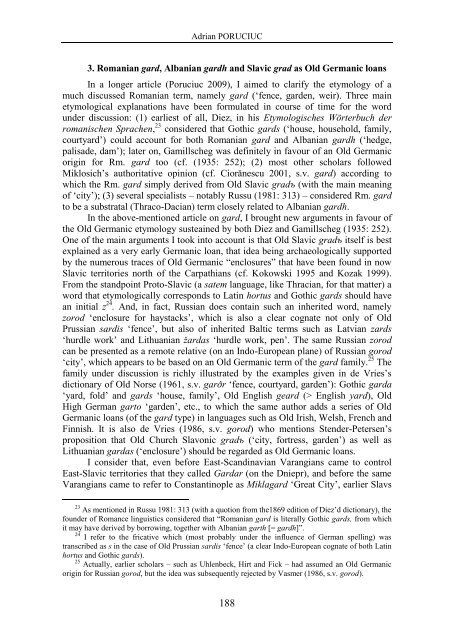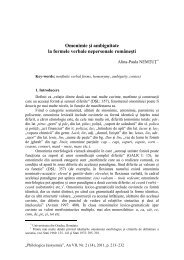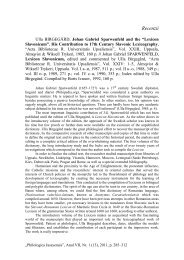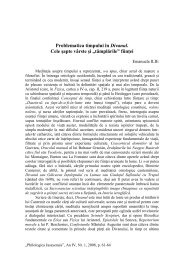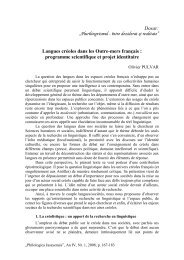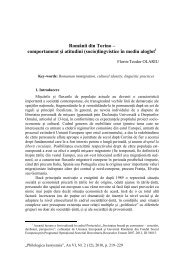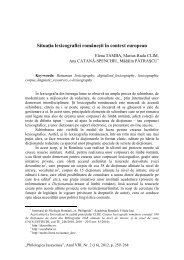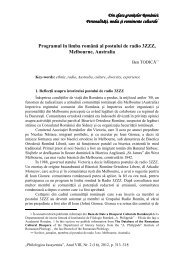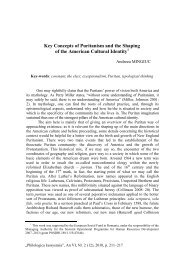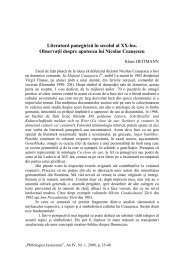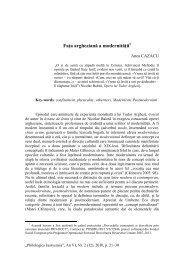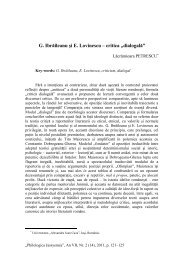O sutÄ de ani de cartografie lingvisticÄ româneascÄ - Philologica ...
O sutÄ de ani de cartografie lingvisticÄ româneascÄ - Philologica ...
O sutÄ de ani de cartografie lingvisticÄ româneascÄ - Philologica ...
Create successful ePaper yourself
Turn your PDF publications into a flip-book with our unique Google optimized e-Paper software.
Adrian PORUCIUC<br />
3. Rom<strong>ani</strong>an gard, Alb<strong>ani</strong>an gardh and Slavic grad as Old Germ<strong>ani</strong>c loans<br />
In a longer article (Poruciuc 2009), I aimed to clarify the etymology of a<br />
much discussed Rom<strong>ani</strong>an term, namely gard (‘fence, gar<strong>de</strong>n, weir). Three main<br />
etymological explanations have been formulated in course of time for the word<br />
un<strong>de</strong>r discussion: (1) earliest of all, Diez, in his Etymologisches Wörterbuch <strong>de</strong>r<br />
rom<strong>ani</strong>schen Sprachen, 23 consi<strong>de</strong>red that Gothic gards (‘house, household, family,<br />
courtyard’) could account for both Rom<strong>ani</strong>an gard and Alb<strong>ani</strong>an gardh (‘hedge,<br />
palisa<strong>de</strong>, dam’); later on, Gamillscheg was <strong>de</strong>finitely in favour of an Old Germ<strong>ani</strong>c<br />
origin for Rm. gard too (cf. (1935: 252); (2) most other scholars followed<br />
Miklosich’s authoritative opinion (cf. Ciorănescu 2001, s.v. gard) according to<br />
which the Rm. gard simply <strong>de</strong>rived from Old Slavic gradъ (with the main me<strong>ani</strong>ng<br />
of ‘city’); (3) several specialists – notably Russu (1981: 313) – consi<strong>de</strong>red Rm. gard<br />
to be a substratal (Thraco-Dacian) term closely related to Alb<strong>ani</strong>an gardh.<br />
In the above-mentioned article on gard, I brought new arguments in favour of<br />
the Old Germ<strong>ani</strong>c etymology susteained by both Diez and Gamillscheg (1935: 252).<br />
One of the main arguments I took into account is that Old Slavic gradъ itself is best<br />
explained as a very early Germ<strong>ani</strong>c loan, that i<strong>de</strong>a being archaeologically supported<br />
by the numerous traces of Old Germ<strong>ani</strong>c “enclosures” that have been found in now<br />
Slavic territories north of the Carpathians (cf. Kokowski 1995 and Kozak 1999).<br />
From the standpoint Proto-Slavic (a satem language, like Thracian, for that matter) a<br />
word that etymologically corresponds to Latin hortus and Gothic gards should have<br />
an initial z 24 . And, in fact, Russian does contain such an inherited word, namely<br />
zorod ‘enclosure for haystacks’, which is also a clear cognate not only of Old<br />
Prussian sardis ‘fence’, but also of inherited Baltic terms such as Latvian zards<br />
‘hurdle work’ and Lithu<strong>ani</strong>an žardas ‘hurdle work, pen’. The same Russian zorod<br />
can be presented as a remote relative (on an Indo-European plane) of Russian gorod<br />
‘city’, which appears to be based on an Old Germ<strong>ani</strong>c term of the gard family. 25 The<br />
family un<strong>de</strong>r discussion is richly illustrated by the examples given in <strong>de</strong> Vries’s<br />
dictionary of Old Norse (1961, s.v. garðr ‘fence, courtyard, gar<strong>de</strong>n’): Gothic garda<br />
‘yard, fold’ and gards ‘house, family’, Old English geard (> English yard), Old<br />
High German garto ‘gar<strong>de</strong>n’, etc., to which the same author adds a series of Old<br />
Germ<strong>ani</strong>c loans (of the gard type) in languages such as Old Irish, Welsh, French and<br />
Finnish. It is also <strong>de</strong> Vries (1986, s.v. gorod) who mentions Sten<strong>de</strong>r-Petersen’s<br />
proposition that Old Church Slavonic gradъ (‘city, fortress, gar<strong>de</strong>n’) as well as<br />
Lithu<strong>ani</strong>an gardas (‘enclosure’) should be regar<strong>de</strong>d as Old Germ<strong>ani</strong>c loans.<br />
I consi<strong>de</strong>r that, even before East-Scandinavian Varangians came to control<br />
East-Slavic territories that they called Gardar (on the Dniepr), and before the same<br />
Varangians came to refer to Constantinople as Miklagard ‘Great City’, earlier Slavs<br />
23 As mentioned in Russu 1981: 313 (with a quotion from the1869 edition of Diez’d dictionary), the<br />
foun<strong>de</strong>r of Romance linguistics consi<strong>de</strong>red that “Rom<strong>ani</strong>an gard is literally Gothic gards, from which<br />
it may have <strong>de</strong>rived by borrowing, together with Alb<strong>ani</strong>an garth [= gardh]”.<br />
24 I refer to the fricative which (most probably un<strong>de</strong>r the influence of German spelling) was<br />
transcribed as s in the case of Old Prussian sardis ‘fence’ (a clear Indo-European cognate of both Latin<br />
hortus and Gothic gards).<br />
25 Actually, earlier scholars – such as Uhlenbeck, Hirt and Fick – had assumed an Old Germ<strong>ani</strong>c<br />
origin for Russian gorod, but the i<strong>de</strong>a was subsequently rejected by Vasmer (1986, s.v. gorod).<br />
188


